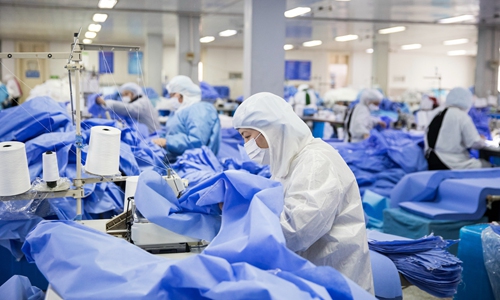HOME >> SOURCE,SPECIAL-COVERAGE
Many SMEs in China will not restart business Monday for shortage of protective supplies
By Li Xuanmin Source:Global Times Published: 2020/2/9 17:35:09

Workers hurry to produce protective suits and face masks at a factory in Hai'an, East China's Jiangsu Province on Thursday amid the nationwide battle against the coronavirus epidemic. Photo: cnsphoto
While most big manufacturers in China such as BYD and Vivo will resume production as planned on Monday, a number of small and medium-sized enterprises (SMEs) across the country are finding it very hard to get their factories humming again on Monday as scheduled.Those SMEs now face a daunting challenge to secure enough protective supplies for their factories amid the outbreak of novel coronavirus pneumonia (NCP), while masks, disinfectant and thermometers - which are in short supply nationwide - are listed as critical preconditions for local governments to approve reopening of SMEs.
"We can't restart the production line on Monday because we failed to meet the conditions for reopening put forward by the industrial park," Duan Lianmin, an owner of a glass factory in Shenzhen, South China's Guangdong Province, told the Global Times on Sunday.
A number of local governments including Guangdong issued an order in early February telling local businesses not to resume work before Monday.
According to a document Duan showed to the Global Times, in order to restart, her company needs to provide isolation rooms, infrared thermometers, disinfectant and masks for every worker for seven days.
In addition, she also needs to provide documents concerning factory workers' information and sign a letter of commitment, which states that she would shoulder responsibility if the factory's "inappropriate operation" leads to cases of infection. Her factory will only be allowed to resume operation if she submits those materials and passes local regulators' on-site inspection.
The management board of the industrial park sent the requirements to Duan on Thursday. Duan has been scrambling to purchase the materials since then as she needs to run her facilities at full swing to catch up with overseas orders.
The local government, according to Duan, has provided a consulting platform that gathers contact information of local mask suppliers. But so far, she cannot buy enough masks as there is a shortage persisting in China.
The severe shortage of protective items is one of the key reasons why many private Chinese factories canceled plans to reopen.
A senior executive at an electronic parts manufacturer based in Dongguan city surnamed Chen told the Global Times that thousands of small electronics makers in Guangdong postponed plans to resume work, some for as long as a week from Monday.
He noted that some Dongguan factories that have stockpiles of masks and disinfectant are still waiting for local officials' inspections and further notification to see if they can restart working on Monday.
"Some downstream assemblers delayed work, either simply because their upstream suppliers have not begun work or delivery services have not gotten back on track," Chen added.
Chen Liang, general manager of Dongguan Jinconn New Material Holdings, a private company that makes magnetic materials, told the Global Times on Sunday that the restrictions on travel, which deter employees from returning to work, also prompted the company to postpone the date when it will reopen.
Chen Liang admitted that resuming work poses some risks. "If one employee is confirmed as being infected with NCP, all our staff will be quarantined and our factory will be closed," he said.
Shenzhen-based smartphone maker Oppo also told the Global Times over the weekend that its factory, which originally delayed production till Monday, will remain suspended.
Other major manufacturers in China including BYD, Vivo and Hyundai Motors told the Global Times over the weekend that they will resume work on Monday.
Lian Ping, chief economist of the Bank of Communications, told the Global Times that factories should prioritize safety issues and should not rush to resume work unless they're in emergency industries. "Private businesses could make up for the loss of one month by ramping up efforts at a later stage."
To ease the burdens of SMEs, local governments are scaling up support. The Dongguan municipal government said in a statement sent to the Global Times that it will refund 50 percent of unemployment insurance premiums as subsidies to affected companies, while waiving rent for up to two months and delaying their social insurance payments.
Posted in: INDUSTRIES,ECONOMY,FEATURE